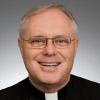In this Year of Faith, I think some attention should be paid to the people who actually teach the faith to our children.
I have the best director of religious education in the country. Her name is Jan Pedone. Jan has been teaching the faith to children and preparing them for the sacraments for more than 25 years, first as a volunteer and then as a paid staff person. She coordinates more than 60 volunteer teachers, classroom aides and other helpers. Together, they educate about 500 children each year. It is a big job that has special challenges in the realities of parish life in the 21st century.
First, there is no parochial school. More than 95 percent are in public schools. That is pretty typical of most parishes. That puts much more pressure on the religious education programs. The next generation of Catholics will come out of voluntary religious education programs like the one in our parish, not parochial schools.
Second, almost everybody is a volunteer. The only paid person in our religious education program is Jan. They are not professional teachers. They are busy people. Almost all of them have full-time jobs outside the home. Some are stay-at-home mothers of large families. One of our volunteer teachers has 11 children.
These volunteers sandwich teaching into already crowded schedules. They prepare for class late at night. None has much training. They rely on the published materials to support them. We have some online training, but mostly they must learn on the job. This puts a big burden on the director who coordinates the program. We need to back the volunteers up with resources.
Third, we don't see the children very much. The children in kindergarten through fifth grade are with us only a little more than one hour per week, 36 weeks each year. That assumes they come to class each week.
It is not much time to impart the faith. We have to rely on parents and the liturgies to reinforce the education. Parents are both the strength and the weakness of religious education.
Fourth, our children come from homes divided by divorce and by religion. Many are children of divorce who live in shared custody arrangements. That means they go to the other parent's house on many weekends.
We cannot offer classes only on Sunday mornings because the kids would probably miss every other week. So for kindergarten through fifth grade, we offer a duplicate set of classes on Monday evenings. This doubles Jan's work, but is necessary if we are going to reach the children of divorce.
Religion also divides our homes. Probably about half of our children come from religiously mixed households. This means that Dad or Mom does not go to our church. Our children raise a lot of questions like: "What about my dad, who is not a Catholic? Is he going to hell?"
We cannot presume that the family will do much religious education at home. They may not go to Mass regularly or pray before meals. Sometimes the kids are in class only to satisfy a grandparent's demands.
Fifth, our youth are easily bored. They are accustomed to the hyperstimulation of the Internet, smartphones, videos and television. There is no perfect solution to this problem.
One thing we tried to do is make it "cool" to go to class.
Older youth don't think it is cool to be around little kids, so we moved our classes for sixth through 12th grades to Wednesday nights and made it the "youth" night.
Adolescents in every century are fixated on friendship. They will come to class if they think their friends will be there. Friends make it "cool." Part of the success of our program is attaining the "critical mass" of more than 100 youth on Wednesdays.
The best part of our religious education is the confirmation preparation program. While there are only about 40 youth actually preparing for confirmation, we have more than twice that number coming to class. Older teens are called "advocates." They act as companions and examples to the younger ones preparing for confirmation. The hidden benefit to our "advocates" is that they repeat the confirmation prep program two or three times during high school.
Jan makes our confirmation program demanding. Classes are an hour and a half each week. We require that the youth sign in for Sunday Mass. They also must do service projects, like working our parish food bank or volunteering in our homeless program.
We include participation in important events like the March for Life or a walk to raise money for our sister parish in Nicaragua. We also require contemplative experiences like eucharistic adoration and reconciliation.
The most important event of the religious education year is our confirmation retreat. They have talks, music, songs, skits and contests. They pray and socialize. It is the best weekend of the year for religious education, and it is the most embarrassing for their pastor, who dresses up in costume each year for the skit. I have been Snow White, Ozzy Osbourne and Superman, among other things.
With the retreat, we get almost as many instructional hours as we do in a semester of classes and a whole lot more fellowship.
What does all this produce? Hopefully, another generation of Catholics. A Pew study says about a third will fall away, but two-thirds will remain Catholic in some form or another.
One thing is for sure: The future of the Catholic church in our culture depends more on religious education directors like Jan Pedone than on bishops and priests.
[Fr. Peter Daly is a priest at the Archdiocese of Washington, D.C., and has been pastor of St. John Vianney parish in Prince Frederick, Md., since 1994.]
Editor's note: We can send you an email alert every time Fr. Peter Daly's column, "Parish Diary," is posted to NCRonline.org. Go to this page and follow directions: Email alert sign-up.




